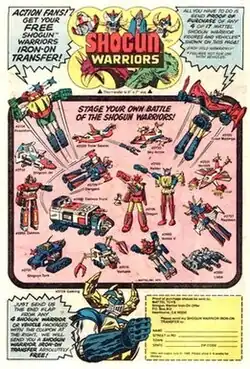Shogun Warriors was a line of toys released by Mattel Inc. in North America from 1979 to 1980.
Overview

The line was drawn from toys originally produced by Japanese company Popy, based on several anime and tokusatsu shows featuring giant robots. They were originally manufactured in three sizes: 24-inch (610 mm) plastic versions, 3.5-inch (89 mm) die-cast metal versions, and slightly taller but much more detailed 5-inch (127 mm) die-cast versions. Several vehicles were also offered, as well as a set that could be put together to form the super robot Combattra.
The toys featured spring-loaded launcher weapons such as missiles, shuriken and battle axes. Some were able to launch their fists, while the later die-cast versions also had the ability to transform into different shapes. Raydeen, for example, could become a birdlike spaceship. These "convertible" versions were the precursors to the Transformers line of toy robots. Toward the end of production, Mattel proposed the inclusion of plastic toy vehicles for the 3.5" figures to ride in exclusively in the United States, but these toys were never released for purchase.
Similar to other toy lines during the 1970s, the Shogun Warriors toys came under pressure over safety concerns regarding their spring-loaded weapons. The concern was that children might launch the weapons and hit other children or pets in the eyes. There was also a risk that small children might choke on the small plastic missiles and other parts. Toy manufacturers then faced new regulations as a result of reported injuries received while playing with these toys. Consequently, many toy companies were forced to remodel existing toy lines with child-safe variations such as spring-loaded "action" missiles that would remain attached to the toy. Missiles were also reshaped to have a flat head instead of a pointed one. Because of this, as well as declining sales, the Shogun Warrior toy line was discontinued by 1980.
Tie-in media
Comic
In order to promote the toys, Mattel approached Marvel Comics to produce a comic tie-in for the range, having enjoyed a fruitful relationship with the company on Godzilla, King of the Monsters.[1] Only three figures would be featured in the comic - Raydeen (originally from Brave Raideen); Dangard Ace (from Wakusei Robo Danguard Ace) and Combatra (from Chōdenji Robo Combattler V). Series artist Doug Moench would also produce some artwork used by Mattel on toy advertisements.[2]
Cartoon
Due to Shogun Warriors being based on characters drawn from a wide number of Japanese TV shows, there was no cartoon produced. However, several of the characters featured in the toy line featured in Jim Terry's Force Five series.
Toy line
Jumbo Machinders
Jumbo Machinders were 24-inch (610 mm) tall vinyl figures.
Die-Cast Action Figures
5-inch (130 mm) figures.
Two-In-Ones
5-inch (130 mm) figures that could be reconfigured between two modes.
Collector's
3-inch (76 mm) figures.
Action Vehicles
Vehicles with action features.
U-Combine Combatra Vehicles
Five vehicles that could be combined to form the super-robot Combattra. Sold both separately and as a boxed set.
- Battle Jet
- Battle Clasher
- Battle Tank
- Battle Marine
- Battle Craft
In popular culture
Several Shogun Warriors appeared in the Wonder Woman episode, "The Deadly Toys" at a toy shop run by Frank Gorshin's character.[3]
Revival
In 2010, Toynami revived the Shogun Warriors name with a new toy line, consisting of 24-inch (610 mm) Jumbo Machinder toys. The first two robots in this line were GoLion and Dairugger XV, both of which were adapted in the Western world as Voltron.[4]
References
- ↑ Smith, Andy (May 2014). "Shogun Warriors - The Sky-High Rise and Abrupt Fall of Three Giant Robots in Comics". Back Issue!. No. 72. TwoMorrows Publishing.
- ↑ "Shogun Warriors (advertisement)" (various) (November 1979). Marvel Comics.
- ↑ "Shogun Warriors in WonderWoman". YouTube.
- ↑ "NYTF 2010: Toynami". Collectiondx.com. February 17, 2010. Archived from the original on June 15, 2012.